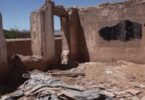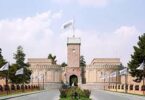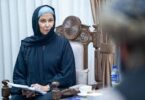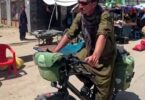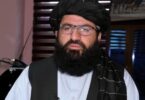Monitoring Desk
KABUL: The Maiwand wrestlers are back, with a vengeance.
Last September, the Islamic State bombed their gym and killed dozens of them. This year they have rebuilt it, and their vengeance has been to make it bigger, better and even busier than it was before.
Last September, I was watching Tolo TV News as one of its journalists, Samim Faramarz, reported live from the scene of the bombing of the Maiwand Wrestling Club gym, in an ethnic Hazara neighborhood in western Kabul.
As he spoke, a second bomb went off, killing Mr. Faramarz and his cameraman, Ramiz Ahmady, on the air.
Because we knew and admired Mr. Faramarz and Mr. Ahmady, and because of the shocking nature of their on-camera deaths — and also because the government, as usual, was covering up the true scale of the carnage — our first article highlighted the journalists and mostly left out the wrestlers.
When it became clear how many casualties there were among the wrestlers, we tried to go back. But those who survived were so angry at us, and at all journalists, that they wouldn’t talk.
They were also busy with funerals and hospital visits; in the end, 26 wrestlers were found to have been killed, and 91 others wounded.
The club has more wrestlers than ever now, sometimes 400 a day. It has had to add a fourth training shift.
Kiana Hayeri Finally, we were able to visit the gym.
Even a week after the bombing, it was horrible. There were still pieces of human flesh scattered in the wreckage, still family members of the dead looking for keepsakes.
Maiwand is our country’s most important wrestling gym, and it traditionally produces many of Afghanistan’s champions; it looked as if this institution was finished forever.
But two former wrestlers came to its rescue after reading our coverage. One was a 69-year-old former IBM executive from Ridgefield, Conn., who introduced himself as “Paul Halsey (114-4),” a reference to the win-loss record in his amateur wrestling career.
Another was Hooman Tavakolian, 42, an Iranian-American investment manager in New York and London, who is active with United World Wrestling and describes himself as a “sports diplomat.”
Mr. Tavakolian started a GoFundMe campaign to rebuild the Maiwand club. Separately, Mr. Halsey got in touch with us, and we forwarded to him requests from readers who wanted to help. Many of those were current or former wrestlers.
Eventually, Mr. Halsey and Mr. Tavakolian found each other and pooled their efforts. Wrestling teams at universities like Penn State and Iowa kicked in; so did Nike, Adidas and the wrestling equipment supplier Cliff Keen. Wrestlers at an American private school contributed.
In all, they raised more than $10,000 in cash, Mr. Tavakolian said, which along with donated gear was enough to rebuild Maiwand. He said there was even money to spare for other Afghan wrestling clubs.
People Don’t Bribe College Officials to Help Their Kids. They Do It to Help Themselves.
When Your Kid Realizes Bedtime Is a Scam
“They all believe we need to show the terrorists that they can kill us, but they can’t stop us,” said the head coach, Maalim Abbas.
“They all believe we need to show the terrorists that they can kill us, but they can’t stop us,” said the head coach, Maalim Abbas.CreditKiana Hayeri for The New York Times
When I revisited Maiwand last month, they had just put the new mats down on the floor. Much of the building, which the bombing had essentially destroyed, was rebuilt, although it still had a temporary roof, since construction work had been slowed by snow and cold.
Security was much heavier than before, too.
The athletes were training for an intra-club match, and they seemed so pleased to see me and Kiana Hayeri, a photographer. Reza Ahmadi, who has been organizing the reconstruction, greeted us by putting his right hand on his heart, because like many pious Afghan men he considers shaking hands with women to be improper.
“We are very thankful for Mr. Hooman and Mr. Paul,” Mr. Ahmadi said. “If they hadn’t helped us, we would never have been able to rebuild our club.”
Maalim Abbas was also there. He was famous as a champion wrestler when he first became head coach at Maiwand, where they call him Teacher Abbas. He is even more famous now, because he kept the suicide bomber outside of the club by blocking a door with his powerful left arm.
Teacher Abbas is back on the job now, despite his amputation. What is most gratifying, he said, is that Maiwand has more wrestlers than ever — as many as 400 a day, so many that the club has had to add a fourth training shift.
“They all believe we need to show the terrorists that they can kill us, but they can’t stop us,” he said.
Mr. Halsey and Mr. Tavakolian were very happy to hear of the wrestlers’ reaction to their efforts.
“Wrestling is a sport that requires great sacrifice and also helps young wrestlers channel their emotions in a positive way,” Mr. Halsey said, explaining his desire to help the club. “The tragedy connected me to them in a very personal way.”
Subscribe for original insights, commentary and discussions on the major news stories of the week, from columnists Max Fisher and Amanda Taub.
Maiwand is the country’s most important wrestling gym, and has produced many Afghan champions.
Many of the 91 people wounded have lifelong, disabling injuries, missing limbs and worse. Five are still in critical condition.
Hajji Juma Khan Hassani’s son Mustafa, 19, is one of those five.
Mustafa, a heavyweight-class wrestler, is still hospitalized and weighs only 101 pounds; he lost much of his intestines. His first cousin Alidad, 24, was killed.
Mr. Hassani said Alidad’s 2-year old daughter, seeing her father’s framed photograph at a memorial service, had grabbed it and kissed it — six times.
“I had to leave the room,” he said, wiping tears from his eyes. “My heart burns every time I remember that.”
Even brave Teacher Abbas is having a hard time coping.
“I can’t sleep properly,” he said. “I have this nightmare in which I lose 26 students, all of them so young.”
“And me, I am not a complete human being now,” he added. “How can I coach wrestling with only one hand? It hurts me that I can only tell them how to do it.”
But how much worse it would have been, he said, not to have a gym for those who fight on.
The bombing might have been even worse if not for Mr. Abbas, the coach, who blocked a door with his powerful left arm and kept the bomber outside. He lost the arm.
Courtesy: (nytimes.com)

